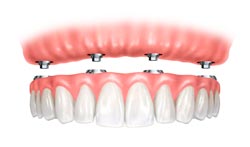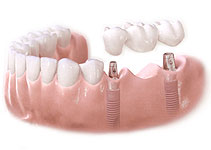What are dental implants?
Used when replacing an entire missing tooth, dental implants are titanium screws that are inserted into the jawbone, to which crowns or a bridge can be attached once the surrounding tissue heals.
Designed to look and function in a similar way to natural teeth, implants are an excellent solution where there is not enough anchoring teeth for bridges, or when a denture cannot be worn.
Titanium is an ideal implant material as it is strong, bio-compatible with living bone and muscle tissue, and most importantly, able to fuse with bone, creating a solid stable structure to cope with the pressures of eating and chewing.
Dental implants are fixed in place, so they won’t move, click or shift, giving you confidence in your smile. They can replace a single tooth, or replace a full set of teeth also known as ALL-On-4.
All-On-4 implants are a great alternative to dentures. Dentures may slip when eating, talking or even laughing which can be rather embarrassing. However, because dental implants last for years and year, it is important to choose the right option tailored to suit your needs.
Dr Karn is able to go through treatment plan options available on the day of your consultation.
Any surgical or invasive procedure carries risks. Before proceeding, you should seek a second opinion from an appropriately qualified health practitioner.
Types of Teeth Implants
Single Tooth Dental Implants

All-On-4™ Dental Implants

Am I a suitable Dental Implant candidate?
Patients with adequate bone structure and without a serious medical conditions can be suitable candidates for dental implants; however
there may be some situations where we will need to recommend other tooth replacement options. Special X-rays help us determine and diagnose the density of your bone as well as other surrounding structures used to determine if you are suitable.
To find out more about dental implants and how they may help you, please contact Dental Excellence for a detailed consultation and assessment.
Dental Implant Treatment stages
Placing the Implant
The implant procedure is conducted under a local anaesthetic, with many patients reporting very little or no discomfort. Requiring only a minor opening in the gum-line, your implant is then guided gently into position.
Healing and recovery
Following the implant placement, you’ll undergo a sequence of appointments to construct your prosthetic tooth replacement. During this phase your healing will be monitored carefully and you’ll have a temporary tooth option in place. Once your implant treatment is complete and your final restoration is connected, you will be able to relax, knowing that your new tooth is stable, secure and reliable.
Placing the crown or bridge
Following your implant procedure it is important to remember that maintaining your oral health is essential. Even though your implant is titanium and your replacement teeth are produced from high quality porcelain, your surrounding teeth and gums are still prone to the effects of gum disease.
Single tooth implant
and crown restoration
Multiple unit implants
with bridge preparation
Multiple unit implant
bridge restoration






